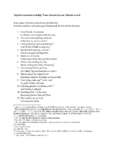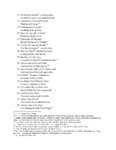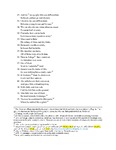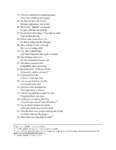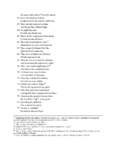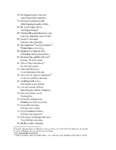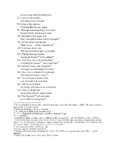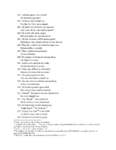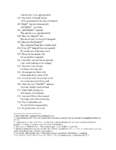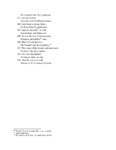Discourses of Muslim Scholars in Colonial Ghana
by John Hanson and Muhammad al-Munir Gibrill
Muslim Revival (historical poem)
Creator: al-ḥājj 'Umar ibn Abī Bakri of Kete-Krachi
Description: This historical poem is composed by al-ḥājj 'Umar Krachi (al-ḥājj 'Umar ibn Abī Bakr) to describe and comment on a Muslim revival movement in northern Ghana in 1904-05.
The Muslim revival had its origins outside of Ghana, and visiting Muslims arrived to stress the need for Muslim reform. The movement may have referenced the coming of the Mahdi, a religious figure some Muslims believe will appear to establish righteousness and justice in advance of Judgment Day. It rallied many Muslims to the cause, but others were opposed, including the author of the poem, and eventually British colonial officials intervened and expelled the Muslim movement's leaders from the region. Earlier claims of the Mahdi's return in the middle Nile valley of today's Sudan may have influenced this movement, and the response in northern Ghana may reflect the unsettled political conditions associated with the recent imposition of European colonial rule (at the time northern Ghana was divided between the Northern Territories of the British Gold Coast Colony and German Togoland). For more information on the Muslim political movement, see Jack Goody, "Reform, Renewal and Resistance: a Mahdi in Northern Ghana," in African Perspectives, edited by Allen Christopher and R.W. Johnson (Cambridge: Cambridge University Press, 1970), 143-56, and Holger Weiss, Between Accommodation and Revivalism: Muslims, the State and Society in Ghana from the Precolonial to the Postcolonial Era (Helsinki: Finnish Oriental Society, 2008) 205-6.
The poem also does not indicate its author, but textual evidence points to al-ḥājj 'Umar ibn Abī Bakr. He was positioned well to provide commentary from this Muslim reform movement, as he witnessed the arrival of one of the proponents in Krachi and heard about the activities of others in neighboring Muslim communities. The poem is one of the few written documents providing information about this revival from a Muslim perspective.
The poem describes the revivalists as Mūsā and his three lieutenants, Ḥussain, Abū Bakr, and Hassan. It is not dated, but textual evidence points to composition in 1905. The text adopts a satirical style to erode Mūsā's authority by revealing his hypocrisy, the abuses of his lieutenants, and the ignorance and gullibility of Muslims supporting the movement, but the descriptions of preaching and other activities also offer valuable contemporaneous insights into the Muslim political movement. The poet, writing at a time when many Muslims supported the movement, takes consolation for his minority views by referencing other persecuted figures in the history of Islam, such as the Prophet Muḥammad, the fourth caliph Alī, and several prominent Muslim scholars.
The poem has mono-rhymed Arabic verses of dual-ḥemistich, and the translation is literal, rendered as a free verse poem for the ease of readers in English. The poem includes ajami (Akan and Hausa words in Arabic script) for places, political titles, ethnic references and a few phrases. In the 1960s Bradford Martin made a very rough English translation of the poem (from document 135 in the Institute of African Studies Arabic collection), but it never was published.
The Muslim revival had its origins outside of Ghana, and visiting Muslims arrived to stress the need for Muslim reform. The movement may have referenced the coming of the Mahdi, a religious figure some Muslims believe will appear to establish righteousness and justice in advance of Judgment Day. It rallied many Muslims to the cause, but others were opposed, including the author of the poem, and eventually British colonial officials intervened and expelled the Muslim movement's leaders from the region. Earlier claims of the Mahdi's return in the middle Nile valley of today's Sudan may have influenced this movement, and the response in northern Ghana may reflect the unsettled political conditions associated with the recent imposition of European colonial rule (at the time northern Ghana was divided between the Northern Territories of the British Gold Coast Colony and German Togoland). For more information on the Muslim political movement, see Jack Goody, "Reform, Renewal and Resistance: a Mahdi in Northern Ghana," in African Perspectives, edited by Allen Christopher and R.W. Johnson (Cambridge: Cambridge University Press, 1970), 143-56, and Holger Weiss, Between Accommodation and Revivalism: Muslims, the State and Society in Ghana from the Precolonial to the Postcolonial Era (Helsinki: Finnish Oriental Society, 2008) 205-6.
The poem also does not indicate its author, but textual evidence points to al-ḥājj 'Umar ibn Abī Bakr. He was positioned well to provide commentary from this Muslim reform movement, as he witnessed the arrival of one of the proponents in Krachi and heard about the activities of others in neighboring Muslim communities. The poem is one of the few written documents providing information about this revival from a Muslim perspective.
The poem describes the revivalists as Mūsā and his three lieutenants, Ḥussain, Abū Bakr, and Hassan. It is not dated, but textual evidence points to composition in 1905. The text adopts a satirical style to erode Mūsā's authority by revealing his hypocrisy, the abuses of his lieutenants, and the ignorance and gullibility of Muslims supporting the movement, but the descriptions of preaching and other activities also offer valuable contemporaneous insights into the Muslim political movement. The poet, writing at a time when many Muslims supported the movement, takes consolation for his minority views by referencing other persecuted figures in the history of Islam, such as the Prophet Muḥammad, the fourth caliph Alī, and several prominent Muslim scholars.
The poem has mono-rhymed Arabic verses of dual-ḥemistich, and the translation is literal, rendered as a free verse poem for the ease of readers in English. The poem includes ajami (Akan and Hausa words in Arabic script) for places, political titles, ethnic references and a few phrases. In the 1960s Bradford Martin made a very rough English translation of the poem (from document 135 in the Institute of African Studies Arabic collection), but it never was published.
Date: 1905
Date Range: 1900-1909
Location: Kete-Krachi , Volta Region, Ghana
Format: Text/jpeg
Language: English
Rights Management: Educational use only, no other permissions
Contributing Institution: Muhammad al-Munir Gibrill; John H. Hanson; Institute of African Studies, University of Ghana at Legon; Northwestern University; MATRIX: The Center for Humane Arts, Letters & Social Sciences Online at Michigan State University
Contributor: Muhammad al-Munir Gibrill (translator and transcriber); John H. Hanson (reviewer)
Digitizer: Muhammad al-Munir Gibrill; MATRIX
Archive: University of Ghana at Legon, Institute of African Studies
Source:
University of Ghana at Legon, Institute of African Studies, Arabic collection, document number 109 (ii). This collection holds another copy of the poem: document number 135.
